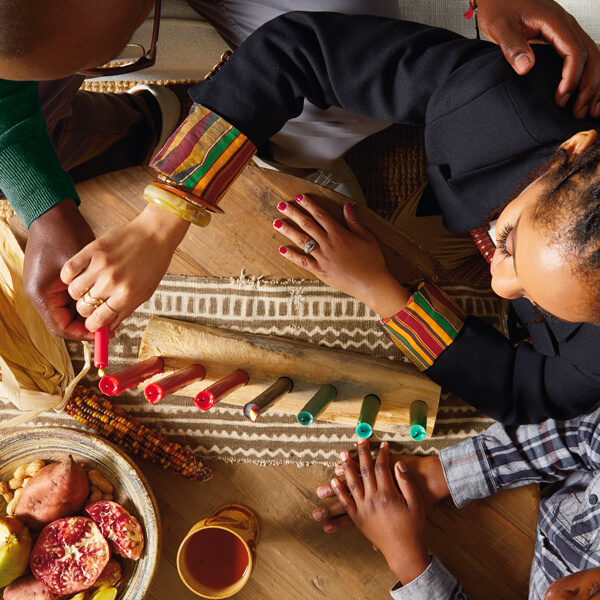What is Lent?

Lent can seem a little mystifying if it’s something you didn’t grow up with. Why do friends talk about “giving something up for Lent”? Why are colleagues showing up to work with ashy smudges on their foreheads on what seems to be a random Wednesday? And just how is a big blowout party like Mardi Gras connected to this deeply meaningful religious observance?
If you’ve ever wondered about any of these things, then keep reading for a little background on what Lent is, why it’s important to Christians and how different people observe it.
Inspired? Create and share by tagging @HallmarkStores.
When Is Lent?
Lent is the roughly six-week period (46 days) leading up to Easter each year. The date of Easter varies from year to year, and the period of Lent varies along with it. Lent always begins on a Wednesday—“Ash Wednesday”—in February or March. Depending on the particular Christian tradition, it lasts until the Thursday or Saturday just before Easter in late March or April.
The word “Lent” comes from the Old English word for spring, and that seasonal meaning endures in the way Christians use it today. Lent is, indeed, a special season, set apart from the “Ordinary Time” that fills up much of the Christian liturgical calendar. Another special, set-apart season is Advent, or the four weeks leading up to Christmas.
The daily devotional podcast Pray as You Go offers a great way to get a feel for the rhythms of the Christian liturgical calendar. Each episode begins with the reader noting the day’s date and which liturgical season it falls under.
A season of preparation
Even more so than Advent, the season of Lent tends to have a contemplative, solemn quality because it’s a time for Christian believers to focus on the sacrifice that Jesus made when he laid down his life to redeem humankind.
Fasting is a common practice during Lent, and it’s a way of reflecting that sacrificial, Christlike spirit. In earlier times, believers would forego all food on certain days during Lent and many still do.
Increasingly, people are choosing to give up meat, alcohol, social media or some other luxury for the duration of Lent. In doing so, they’re seeking to draw closer to God. They’re eliminating distractions and preparing their hearts to fully experience the gift of Jesus’ life for theirs, along with the miracle of his resurrection.
“To me, Lent is a deliberate limiting of self for the purpose of paying attention to God. It’s surprising that something as all-encompassing as God could ever not be focused on, but it happens. Lent helps me see just how much.” —Dan T.
Is Lent for Catholics only?
No, protestant Christians of many denominations also choose to observe Lent. It may or may not be emphasized at the church they belong to, but they can still bring Lenten practices into their personal spiritual life and that of their family. In general, Lent receives greater emphasis in Catholic, Anglican, Orthodox and other traditions that embrace a more formal liturgy, but it can be a meaningful time for any Christian.
“My family belonged to a small Episcopal church in a central Kansas town of about 5,000 people. My mother volunteered much of her time to the church. She observed the Lenten season not so much as a time of abstention (although she skipped meat on Fridays) but as an opportunity to devote even more effort to the church community’s physical needs: groundskeeping tasks, refinishing furniture, preparing meals. She gave as much of her time in Lent back to God as she was able.” —Kevin D.
Ash Wednesday
Ash Wednesday is the first day of Lent each year. Some believers will fast on Ash Wednesday, even if they don’t plan to practice any other kind of fast or sacrifice during Lent. Catholic, Anglican and many other churches will offer an Ash Wednesday service, incorporating the distribution of ashes. At the service, a participant may choose to have their priest or pastor make the sign of the cross, in ashes, on their forehead, and it can be a very moving and powerful experience:
“On Ash Wednesday, sitting in the choir loft and watching everyone kneel for the imposition of ashes—those that I know are older or are in poor health, babies, newlyweds, new parents—I usually end up just mouthing the words to whatever we’re supposed to be singing and trying not to cry.” —Mark M.
The ashes symbolize repentance from sin and serve as a reminder of believers’ own mortality and need for redemption through faith. Some churches obtain their ashes by burning the palm branches used during the previous year’s Palm Sunday service (the Sunday before Easter). The branches are used to commemorate Jesus’ entry into Jerusalem, where crowds greeted him by waving palm branches and laying them at his feet.
Shrove Tuesday, Mardi Gras and Carnival
Shrove Tuesday and Mardi Gras are two different names for the Tuesday right before Ash Wednesday and the beginning of Lent. “Shrove” or “shriven” literally means to be absolved from sin. In the UK, Shrove Tuesday is commonly referred to as Pancake Day and is known for big crepe or pancake feasts meant to remove temptation by using up all the indulgent foods that Christians won’t be eating during Lent.
“Even a lot of nonreligious people in the UK will have pancakes on this day. My family has pancakes (if I remember and have the right ingredients in!) but we don’t really think of it as a religious thing, even though we are regular worshippers. I like traditional lemon juice and sugar on mine, but the kids often have Nutella or syrup on theirs, or even strawberries and whipped cream if we have them in. So they are certainly taking the ‘using up rich foods’ message on board!” —Caroline C.
Mardi Gras, which is French for “Fat Tuesday,” offers an even better clue about the spirit of this last hurrah before the sacrificial season of Lent. New Orleans, LA, is the city best known for its Mardi Gras parades and balls, and it attracts more than a million visitors to the city each year. However, NOLA is far from the only place to celebrate Mardi Gras. It’s also popular in Alabama and Florida, and even cities as far away as Los Angeles are known for their Fat Tuesday festivities. In any location, the idea is for people to seize their last chance to enjoy all the indulgences they plan to give up for the next several weeks before Easter.
Mardi Gras also has special significance for Black Americans. During segregation, when Black people were excluded from the biggest Mardi Gras parades in New Orleans, they organized rival parades originating in their own neighborhoods, and rich musical and costume traditions grew up around them. Notable African-American parade groups include Zulu and various “tribes” of Mardi Gras Indians, the latter honoring historical ties of friendship between Black and indigenous Americans.
Carnival is another variation on pre-Lent celebrating, and it’s an even bigger party: It starts on the Friday before Lent. Brazil’s are the best-known Carnival celebrations, with their music, dancing and elaborate costumes, but Carnival is also celebrated in cities worldwide, especially those with significant populations of people with Caribbean or South American roots.
Differing approaches to Lent
Lent looks different for different people. The Bible doesn’t lay out a specific set of instructions on how to observe Lent, so Christians are free to find their own ways of drawing closer to God during this season. Some believers are moving away from formal services and fasting toward a more personal observance of Lent:
“These days, instead of giving something up as we did traditionally, I try to help the kids focus on simple, daily ways we can share love and kindness with others. One thing I’ve been trying to help them understand, especially with all we’re going through globally right now, is how significant those darker, more somber times are, because they can lead to something beautiful if we are able to be patient, allow for transformation and look for silver linings.” —Paige D.
At the same time, others are gravitating back toward more formal ways of setting aside this season as sacred and special:
“When my family moved from a casual, modern-worship church to an Anglican one, I was interested in going to the church’s Ash Wednesday service. I didn’t know what to expect. Before, I was afraid I’d feel out of place participating in a service that I had very little experience with. On the contrary, I felt miraculously unified with the rest of the congregation and so touched by the humbling Lenten message of ‘from dust you came and to dust you will return’ that during our time of singing I was moved to tears.” —Olivia C.
Lent is a quiet season of faith that has had a broad cultural influence around the world. Although it’s a specifically Christian observance, anyone who wishes to can find something beneficial to borrow from Lent, whether it’s setting aside technological distractions for a time to focus on in-person relationships or designating a season each year to volunteer more of your time and talents to a worthy cause.
Shop Easter
See allYou may also like
See more-
Christmas Sweet dreams, Santa!
Catch Santa napping on the job with this Snoring Santa Keepsake Ornament featuring sound and motion. With every snore...
-
Kwanzaa What is Kwanzaa?
What is Kwanzaa? A festival of lights rich in African symbolism, it takes place each year from December 26th through ...
-
Christmas Advent calendar activities for adventurous families
It’s time to start the countdown. Maybe it’s about being mindful…or counting your blessings…or preempting your kids a...
-
Summer Ways to celebrate Juneteenth
While Juneteenth was officially recognized as a federal holiday in 2021, this pivotal moment in history has been cele...
-
Christmas Christmas and Kwanzaa: Keeping family holiday traditions and finding your own
Whether you’re single or starting a family, religious or agnostic, someone who celebrates Christmas and Kwanzaa or ju...
-
Halloween Make ghosts and goblins feel right at home this Halloween
Light up your home with haunting Halloween seasonal decor. 🎃👻 Shop now at Hallmark Gold Crown stores or at Hallmark.com.
-
Halloween No scaredy cats around here!
When this black cat crosses your path, you know fun can't be far behind. 😻 🧙♀️ Shop the Zip-A-Long Cat in Hallmark G...
-
Halloween While you’re waiting for The Great Pumpkin this Halloween…
Fly around the pumpkin patch with Zip-a-long Snoopy! 🎃 Shop more frightening finds in Hallmark Gold Crown stores and ...
-
Halloween Light up the night with frightful fun!
Could it be? Could it be!? Yes it is! It’s the Peanuts® Snoopy and Woodstock Halloween figurine! 🎃 🐶 Find it and more...
-
Halloween Where cozy meets mischief and magic
Make some magic this Halloween with this Hocus Pocus hooded blanket. 🧙♀️👻Find more Halloween essentials in Hallmark ...
-
Gifting Relive a favorite from your childhood!
Fill your home with a few small joys inspired by Disney’s “It’s a Small World” 🩵🎎 Shop the collection at Hallmark Gol...
-
Halloween Which house will you be sorted into?
The Harry Potter™ Sorting Hat™ Mug plays sound whenever you lift the lid. Find this chatty mug in Hallmark Gold Crown...
-
Encouragement How to support caregivers
It’s often hard to know how to support a caregiver. Most caregiving checklists out there hit the major topics like me...
-
Love 50 different ways to say I love you
You don’t need to wait for a special occasion to remind that certain someone how much he or she is loved. Spice up yo...
-
Graduation 15 graduation quotes
Celebrate your favorite grad’s milestone with the wit and wisdom of Hallmark writers, fans and others. We’ve rounded ...
-
Congratulations How to congratulate someone
Congratulating others is easy and fun, right? Like when your friend worked really hard and got that awesome job makin...
-
Care & Concern Be more caring with a kindness journal
It's obvious the world could use more kindness. So this year, why not make "be more caring" your number one resolutio...
-
Fall Día de Muertos: A celebration of life and love
Día de Muertos, Day of the Dead, is a holiday originally celebrated in the southern and central parts of Mexico and i...
-
Card Ideas Card messages for kids: What to write in a kid’s holiday card and more
My 3-year-old was having a hard time at preschool drop-off. Dragging his feet. Asking to stay home. This went on a fe...
-
Christmas 6 Creative Christmas Card Display Ideas
Holiday card season is here: Our mailboxes are about to fill up with festive envelopes with pretty stamps and familia...





















